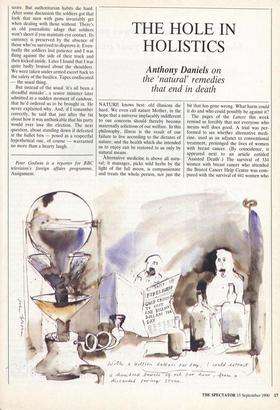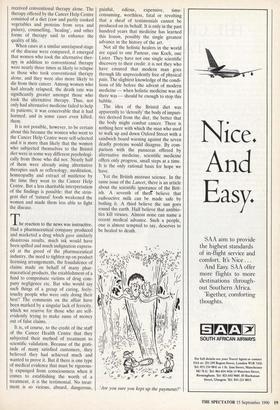THE HOLE IN HOLISTICS
Anthony Daniels on the 'natural' remedies that end in death
NATURE knows best: old illusions die hard. We even call nature Mother, in the hope that a universe implacably indifferent to our concerns should thereby become maternally solicitous of our welfare. In this philosophy, illness is the result of our failure to live according to the dictates of nature; and the health which she intended us to enjoy can be restored to us only by natural means.
Alternative medicine is above all natu- ral; it massages, picks wild herbs by the light of the full moon, is compassionate and treats the whole person, not just the bit that has gone wrong. What harm could it do and who could possibly be against it?
The pages of the Lancet this week remind us forcibly that not everyone who means well does good. A trial was per- formed to see whether alternative medi- cine, used as an adjunct to conventional treatment, prolonged the lives of women with breast cancer. (By coincidence, it appeared next to an article entitled 'Assisted Death'.) The survival of 334 women with breast cancer who attended the Bristol Cancer Help Centre was com- pared with the survival of 441 women who received conventional therapy alone. The therapy offered by the Cancer Help Centre consisted of a diet (raw and partly cooked vegetables and proteins from soya and pulses), counselling, 'healing', and other forms of therapy said to enhance the quality of life.
When cases at a similar unrelapsed stage of the disease were compared, it emerged that women who took the alternative ther- apy in addition to conventional therapy were nearly three times as likely to relapse as those who took conventional therapy alone, and they were also more likely to die from their cancer. Among women who had already relapsed, the death rate was significantly greater amongst those who took the alternative therapy. Thus, not only had alternative medicine failed to help its patients; it was conceivable that it had harmed, and in some cases even killed, them.
It is not possible, however, to be certain about this because the women who went to the Cancer Help Centre were self-selected and it is more than likely that the women who subjected themselves to the Bristol diet were in some way different psychologi- cally from those who did not. Nearly half of them were already using alternative therapies such as reflexology, meditation, homeopathy and extract of mistletoe by the time they went to the Cancer Help Centre. But a less charitable interpretation of the findings is possible: that the strin- gent diet of 'natural' foods weakened the women and made them less able to fight the disease.
The reaction to the news was instructive. Had a pharmaceutical company produced and marketed a drug which gave similarly disastrous results, much ink would have been spilled and much indignation express- ed at the greed of the pharmaceutical industry, the need to tighten up on product licensing arrangements, the fraudulence of claims made on behalf of many phar- maceutical products, the establishment of a fund to compensate victims of drug com- pany negligence etc. But who would say such things of a group of caring, feely- touchy people who were only doing their best? The comments on the affair have been marked by a singular lack of ferocity, which we reserve for those who are self- evidently trying to make sums of money out of false claims.
It is, of course, to the credit of the staff of the Cancer Health Centre that they subjected their method of treatment to scientific validation. Because of the grati- tude of many satisfied customers, they believed they had achieved much and wanted to prove it. But if there is one type of medical evidence that must be rigorous- ly expunged from consciousness when it comes to establishing the worth of a treatment, it is the testimonial. No treat- ment is so vicious, absurd, dangerous, painful, odious, expensive, time- consuming, worthless, fatal or revolting that a sheaf of testimonials cannot be produced on its behalf. It is only in the past hundred years that medicine has learned this lesson, possibly the single greatest advance in the history of the art.
Not all the holistic healers in the world are equal to one Pasteur, one Koch, one Lister. They have not one single scientific discovery to their credit: it is not they who have ensured that modern man goes through life unprecedently free of physical pain. The slightest knowledge of the condi- tions of life before the advent of modern medicine — when holistic medicine was all there was — should be enough to stop this babble.
The idea of the Bristol diet was apparently to 'detoxify' the body of impuri- ties derived from the diet, the better that the body might combat cancer. There is nothing here with which the man who used to walk up and down Oxford Street with a sandwich board warning against the seven deadly proteins would disagree. By com- parison with the panaceas offered by alternative medicine, scientific medicine offers only progress, small steps at a time. It is the only rational basis for hope we have.
Yet the British mistrust science. In the 'same issue of the Lancet, there is an article about the scientific ignorance of the Brit- ish. A seventh of their believe that radioactive milk can be made safe by boiling it. A third believe the sun goes round the earth. Half believe that antibio- tics kill viruses. Almost none can name a recent medical advance. Such a people, one is almost tempted to say, deserves to be healed to death.
'Are you sure you kept up the payments?'



























































 Previous page
Previous page